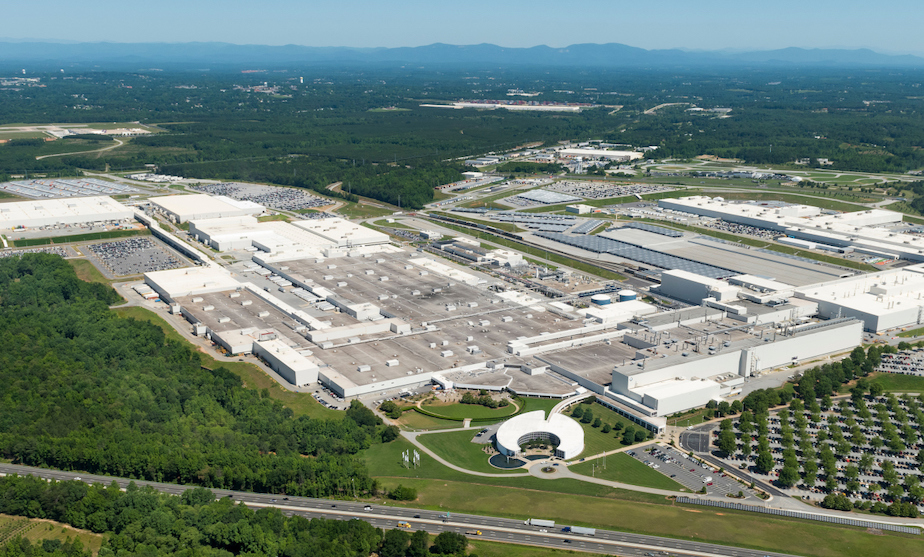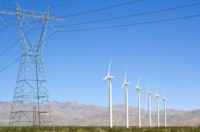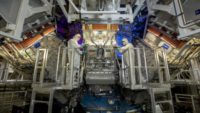Major automakers have announced billions in new capital investment in recent days to boost the American manufacturing supply chain for electric vehicle and battery component production—with a $2.8-billion cash infusion from the U.S. Energy Dept, also announced to spur other plant projects.
BMW Group said Oct. 19 it will invest $1.7 billion in its South Carolina-based operations, including $700 million to build an estimated 1-million-sq-ft high-voltage battery assembly plant in Woodruff and $1 billion to expand and retool its plant in Spartanburg to build electric vehicles.
The South Carolina EV complex "will be a major driver for our electrification strategy, and we will produce at least six fully electric BMW X models here by 2030," said BMW Group Chairman Oliver Zipse.
The company says CO2 emissions from cell production will be cut by up to 60% through partial use of secondary lithium, cobalt and nickel material, as well as renewable energy for production. BMW also said it will build a total of four battery cell plants in Europe and China through local partners.
Japan-based Envision AESC also plans to build a lithium-ion battery cell plant nearby under an agreement with BMW and is looking for a site to produce up tp 30GWh of capacity annually, It has an existing plant in Tennessee and a $2-billion plant under construction in Kentucky that in its first phase will build batteries for 300,000 vehicles of various manufacturers, the company said.
According to BMW, its South Carolina plant, built three decades ago, has capacity to produce 450,000 vehicles annually, with 70,000 electric vehicles builr last year.
Honda and LG Energy Solutions also announced Oct. 11 that they will locate their joint venture battery plant in Fayette County, Ohio, about 40 miles southwest of Columbus. Construction is set to begin in 2023 pending regulatory approvals, the companies said.
Mass production of the lithium-ion batteries in the estimated $4.2-billion complex will begin by the end of 2025. About $700 million will be invested by Honda to retool existing vehicle plants in Union County, Shelby County and Logan County.
Fayette County Engineer Steve Luebbe said about $100 million of infrastructure improvements are needed for the battery production plant, including $70 million for water, $20 million for sewers and $10 million for roads and utility lines.
Names of design firms and contractors for the new plants were not disclosed by the automakers.
Seeding Growth
DOE added to the investment chain in announcing the first set of projects funded by the Infrastructure Investment and Jobs Act to expand domestic battery manufacturing for EV and power grid components or materials that now are imported.
Twenty companies will receive funding to build and expand commercial scale plants in 12 states to extract and process battery materials, manufacture components and demonstrate new approaches. The companies will invest another $10 billion.
The largest DOE-funded project is a $1.4-billion lithium battery separator manufacturing plant by ENTEK in Henderson, Nev.. The company is investing $1.2 billion and DOE is providing $200 million.
ENTEK is the only U.S. based manufacturer of “wet process” separators preferred by EV battery producers, the firm said, adding that it is a vertically integrated engineering, project management and equipment fabrication company with extensive experience in separator plant design, construction and commissioning.
Ascend Elements received the largest total DOE funding—about $480 million—for two plants to be built in Hopkinsville, Ky., which DOE terms a "disadvantaged community." The facilities, which will produce and recycle cathode active materials needed for lithium-ion batteries in EVs and energy storage systems, will be the first such such U.S. plants at commercial-scale.
Ascend, based in Westborough, Mass., will match the total DOE investment, said the agency. "Today, we've begun building something that doesn't exist anywhere in the United State–a domestic source of sustainable lithium-ion cathode material for EV batteries," said firm CEO Michael O'Kronley.
Project work has begun and is set to complete in 2024. Company customers include American Honda Motor Co., EcoPro Group and SK Battery America, media report.
Kentucky Gov. Andy Bashear said in a statement that EV investment in the state since June 2020 exceeds $9.2 billion, with more than 8,500 full-time jobs forecast by sector companies.
DOE also selected Australia-based Syrah Resources for a $220-million grant that could potentially quadruple its planned anode materials plant in Vidalia, La. The company earlier this year received a $102-million agency loan to build a 11,250 ton-per-year plant, now under construction. With the added DOE funding, the firm said it could expand the facility to produce 45,000 tons per year. Syrah will match the DOE grant with a $225 million investment.
The smaller plant is expected to start production in the third quarter of 2023. It will be the only vertically integrated and large-scale natural graphite active anode material producer outside China and the first in the U.S, the company said. Worley Group has been hired for engineering and procurement services, Syrah said previously.
The company has a non-binding pact with LG Energy Solutions to finalize by Dec. 21 a binding offtake agreement for 2,000 tons per year of active anode material beginning in 2025 that would increase to at least 10,000 tpy with the plant expansion.
Manufacturer Tesla also has an offtake deal reached last year for 8,000 tpy, and in July, Syrah signed an agreement with Ford Motor Co. and its joint venture partner South Korea-based SK Innovation to negotiate an offtake arrangement by December for an undisclosed amount of product for EV plants in Tennessee and Kentucky.
A definitive feasibility study on the expansion is underway. Detailed engineering, procurement and construction will follow the study, subject to Syrah board approval and customer financing commitments.
Niagara Falls, N.Y.-based Anovion Battery Materials plans to build the first commercial capacity synthetic graphite anode material for use in lithium-ion batteries and energy storage in Alabama and was selected to receive a $117-million grant by DOE. The company will add $294 million to support the project.
CEO Eric Stopka said construction will begin in mid-2023 and will be fully operational in 2025 to produce 35,000 tons of the material. The company is looking for a site in northern Alabama near TVA utilities with skilled labor availability and rail and river access, he said.
Talon Nickel (USA) LLC would add $114.8 million in DOE funding to its $318-million investment to build a battery minerals processing facility in North Dakota's Mercer County to support a new domestic cathode battery supply chain, the agency said.
Talon has signed a supply agreement with Tesla to produce nickel, copper, cobalt and iron in nickel and copper concentrates, said DOE, adding that the firm also "has concluded a neutrality and workforce development agreement with the United Steelworkers Union" for jobs at its facility, and "is in the process of finalizing project labor agreements with building trades unions in North Dakota."
Speaking to an American Council on Renewable Energy conference on Oct. 13, Maria Robinson, DOE Grid Deployment Office director, noted also the component production funding and tax credit boost expected from the just enacted Inflation Reduction Act, but she said capacity will still struggle to meet short-term needs of manufacturing, renewable energy and transmission sectors.
"What keeps me up at night is certainly a lot of the concerns around supply chain that we are hearing from industry," she said, pointing to 90-week average lead time for large-scale transformers and six-to-nine month average lead time for distribution transformers.
"This is a great opportunity, at the same time, for the United States to get on board with greater manufacturing of some of these grid components here," Robinson said.







Post a comment to this article
Report Abusive Comment